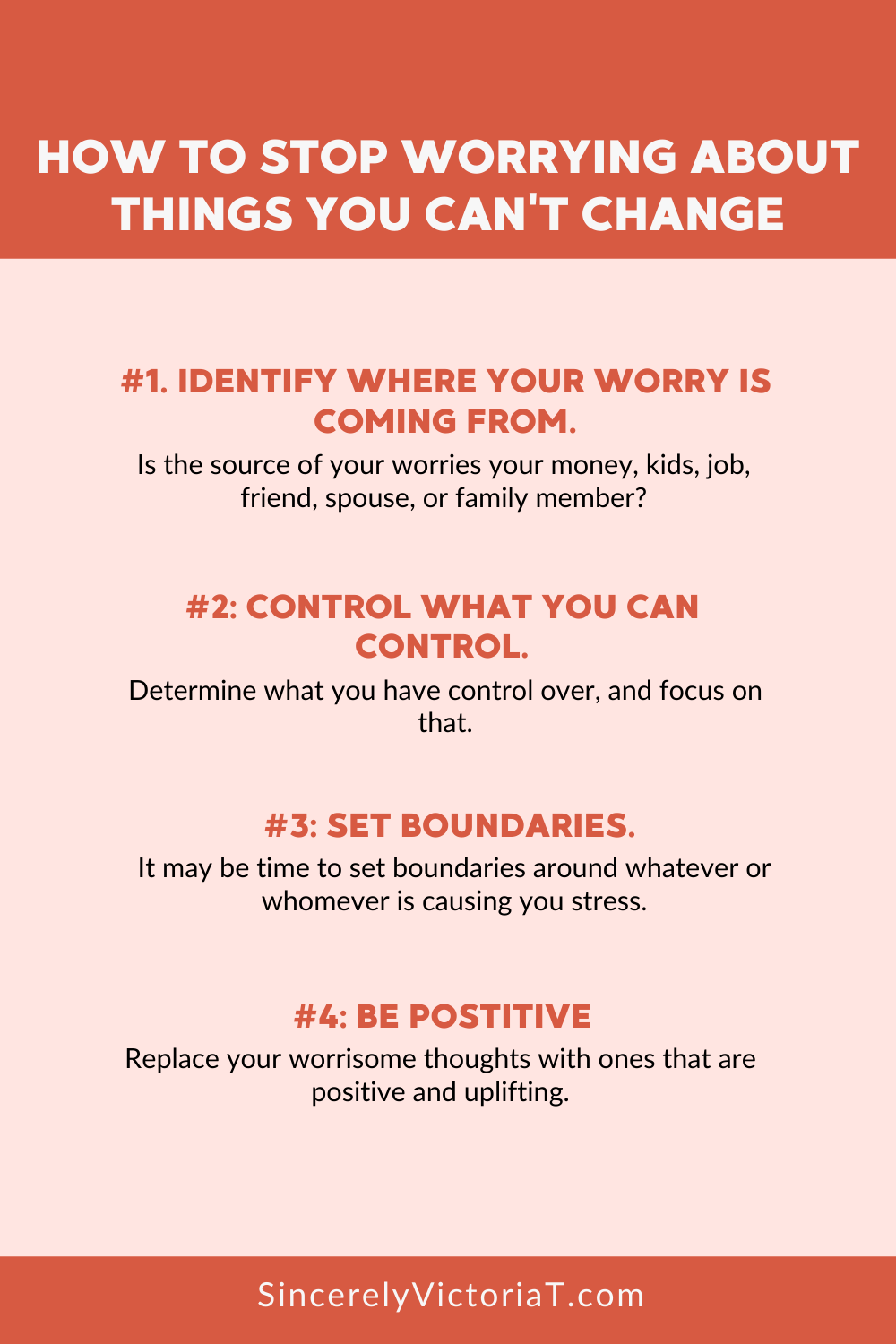Have you ever found yourself mindlessly worrying about things you can’t control? I am a bit of a drama queen, and my thoughts can take over if I’m not careful. “I hope the kids are OK at school.” “I wonder if it’s going to rain during our vacation?” “Who is going to win the election?” Sometimes self-care means to stop worrying about the things you can’t change.
This week, I found myself worrying about something that I have no control over. The thought was always in the back of my mind, waiting for an opportunity to distract me from whatever I was doing at the moment. In fact, I obsessed over it so much during the day, that I even had a dream about it when I went to sleep last night.
After days of obsessing over the situation, it still didn’t change. My worrying didn’t change anything, and it never does. All I did was waste time, energy, and mind space concerning myself with it. After all, there was nothing I could do to fix the situation, so why was I obsessing over it?
Created to be nurturers, women want everyone and everything to OK. We can’t help it, but our motherly DNA is programmed for us to care. Although it is admirable to have concern for others, many of us make the mistake of taking on too much at one time. Other people’s problems become our problems, causing us to worry about the things and people we love the most.
There is a fine line between “caring” and “obsessing over”. If you find yourself worrying about things you can’t change, it may be time to re-evaluate your daily habits. So many of us try to be “Superwoman” and end up stressed out and mentally exhausted.
For many years, I worried too much about someone in my life. I would stay up late thinking about them, worrying and praying, hoping their situation would get better. But things never changed. I wasted energy staying up late worrying about the other person’s problems, while the person I was worried about was across town getting the best sleep of their life. If you want to stop worrying about things you can’t control, you have to learn to protect your peace.

Why are we constantly worrying about things we can’t change? You may have convinced yourself that if you worry about a problem long enough, you’ll find a solution. Maybe you are convinced that the more you worry about it the more you care. If you are a solution-oriented problem solver, it’s tough to break the habit of worry because you always want to fix it. Trust me, I’ve been there. Despite what you have told yourself, please understand that worrying is the problem, not a solution. When you worry you aren’t helping anyone. You are actually hurting yourself from the inside out.
If you find yourself always worrying about things you can’t change, chances are you looking at yourself or the world in a distorted way. If you always feel that things will turn out badly or immediately jump to worst-case scenarios, it’s time to change the way you think. These types of thoughts, are called cognitive distortions and will cause you to worry more.
Over time, constant worrying and negative thinking will take a toll on your emotional and physical health. Worrying about things you can’t change can drain your emotional strength and make it difficult to concentrate at work, school, or on simple daily tasks.
Worry and stress have been proven to cause physical health issues such as insomnia, headaches, stomach problems, and muscle tension. For a long time, I thought I had insomnia and other sleep problems. Problem was, I was too stressed out to function. When I stopped obsessing over things and I couldn’t control, my headaches stopped and I started to sleep better at night.
If you struggle with worrying about things you can’t control, the best way to care for yourself is to lessen your mental load. I know, it’s easier said than done, but the habit of worrying is all mental. When you learn to control the thoughts that run rampant in your head, you are less likely to struggle with worrying about the things going on around you.
Examples of anxious thoughts that may be hindering you:
- you say to yourself, “If everything is not perfect, I’m a total failure.”
- discrediting your own ability to handle life’s problems
- you wake up and think to yourself: “I just know something terrible is going to happen today.”
- assuming everything will fall apart at the first sign of trouble
- projecting your worry onto others by saying things like “I can tell she secretly hates me.”
When you start to worry, challenge your negative thoughts. Ask yourself:
- Is there evidence that this thought is true?
- Is there a more positive or realistic way of looking at this situation?
- Will what I’m worried about actually happen?
- What would I say to a friend who had this worry?
If you can learn to change your mind about how you see yourself and how you see the world, you can beat the worry. You aren’t Superwoman, and you can’t save everyone and everything. Do your best with the things that you can control, and pray for the people and things you can’t control. When worry starts to creep into my mind, here’s what I do:

4 Steps to Stop Worrying About Things You Can’t Change
#1. Identify where the worry is coming from. To stop worrying about things you can’t change, you have to determine where your worries are coming from. Is the source of your worries your money, kids, job, friend, spouse, or family member? Pinpointing where your worries are coming from helps you to determine what to do next.
When you begin to worry ask yourself, “WHY am I worried out about this?” Is there an underlying cause or deeper issue that is causing you to freak out? Determine why this particular person or situation is taking up so much mental space in your mind, and address any fears that you have concerning it.
#2. Control what you can control. If you are stressed over a situation, determine what you have control over, and focus on that. In a situation where you feel you have no control, you still have control – over your mind. Determine you aren’t going to stress out or obsesses over the situation. Make up your mind that you will stop worrying about things you can’t change.
#3. Set boundaries. You may not have control over a circumstance, but you do have control over how much you are involved with it. It may be time to set boundaries around whatever or whoever is causing your mental stress. If a particular person causes you to worry, it’s OK to say “I can’t talk right now” if you aren’t mentally prepared for the conversation. Your personal mental health is determined by what you allow and don’t allow yourself to be involved with.
For example: If your friend always shares details about her wild love life, and you find yourself worrying about her every time she goes out on a date, you may need to set boundaries with your friend. Explain to her that you don’t want to discuss the details of her love life and that her drama is causing you to worry about her.
#4. Use daily affirmations and speak positive words. Scientists estimate people have about 70,000 thoughts per day. Because you have so many thoughts, it’s important to monitor the ones you are having. To stop worrying about things you can’t change, you have to replace your worrisome thoughts with ones that are positive and encouraging. Protect your peace by creating peaceful environments when you feel stressed or worried.
For example: Instead of thinking to yourself, “I just know something terrible is going to happen today” say “today is going to be a great day!” instead. It may seem cliche, but the act of speaking positively can have a better impact on you than speaking negatively.
I hope these tips help!
Sincerely, Victoria







Leave a Reply